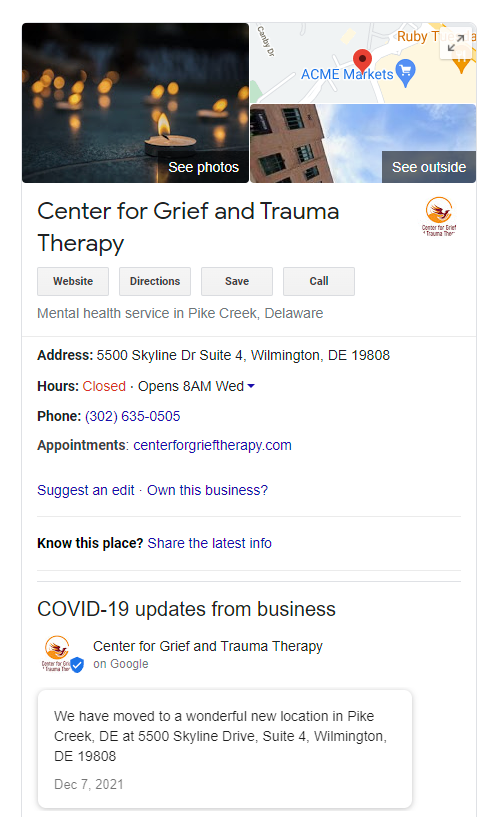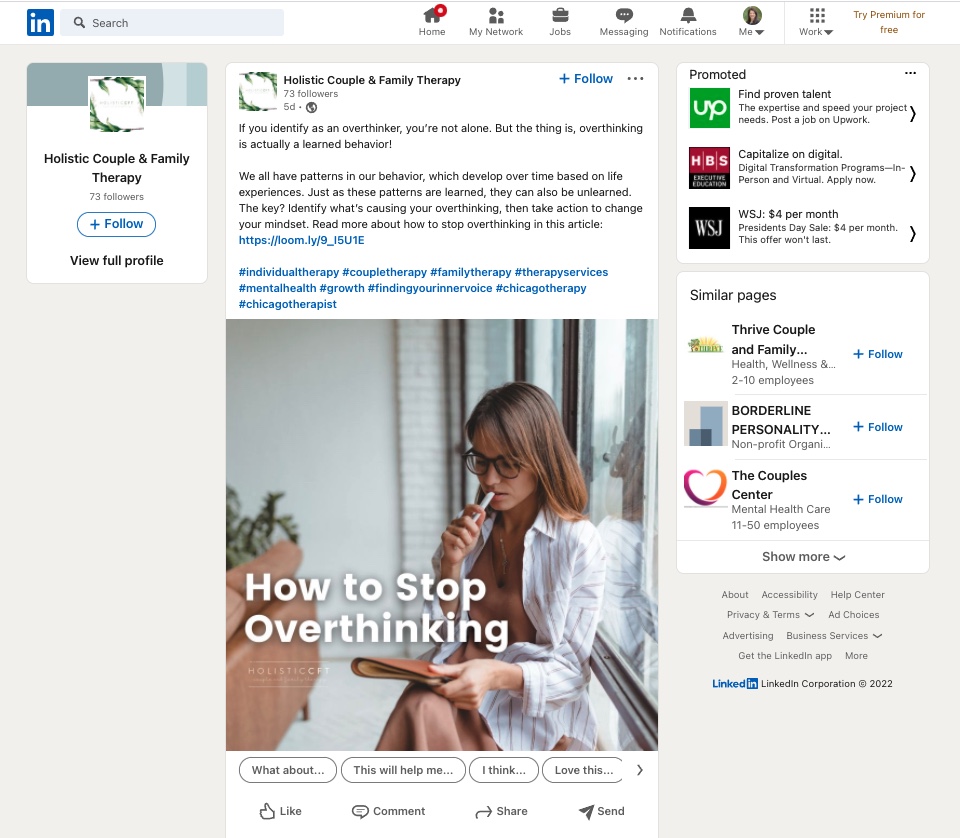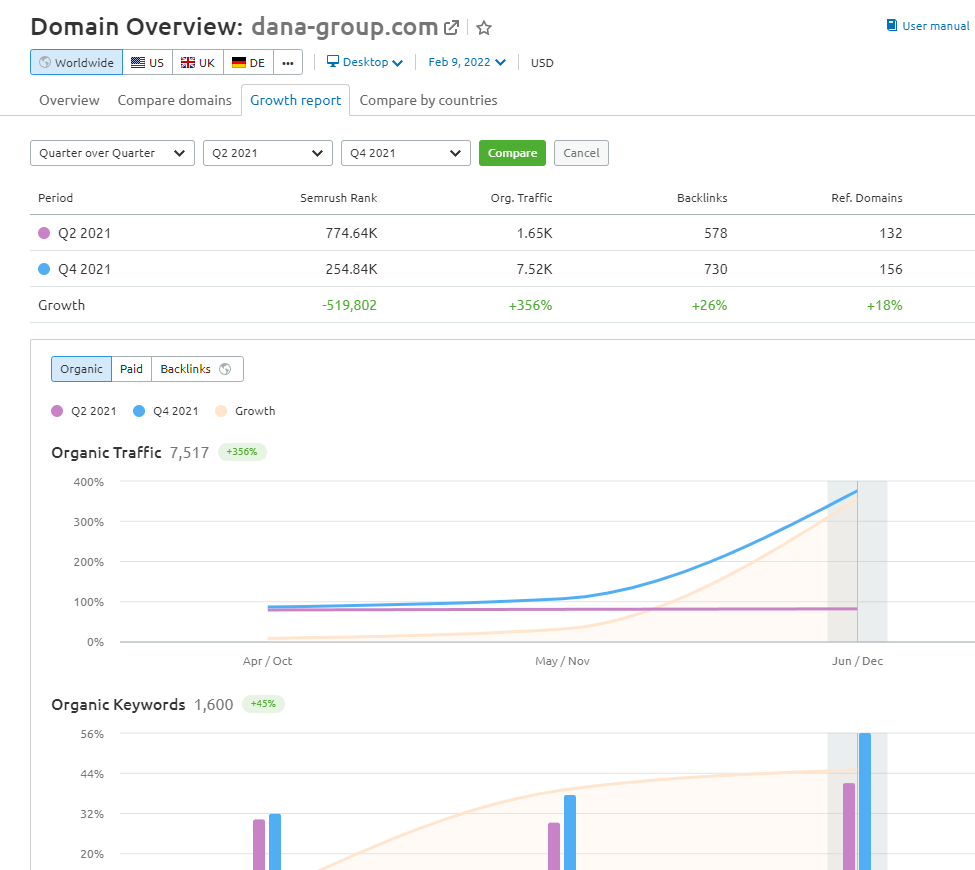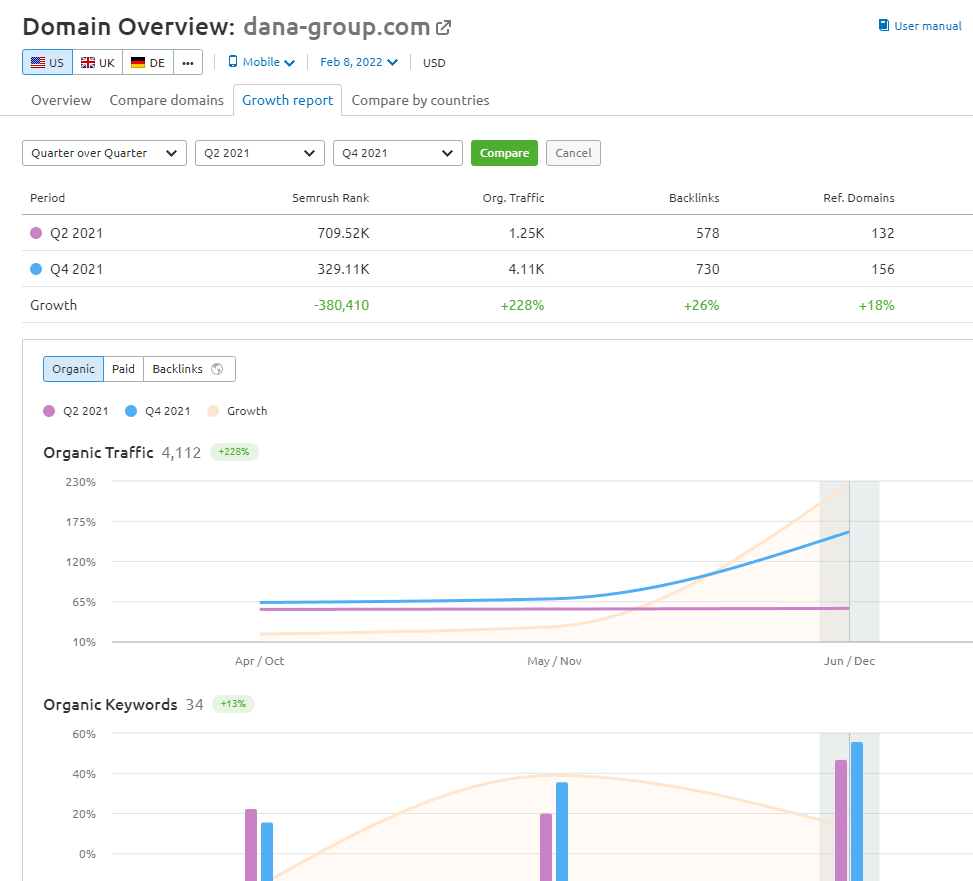One of the most effective ways to get new clients is your online presence. People are looking for everything on the internet, including mental health services. This makes it essential for your mental health clinic to be active and available for their use.
Mental health clinics can benefit from several tools to extend your reach to new clients. Thoroughly understanding your brand is critical for reaching the demographic you want to target and maintaining consistency across all online platforms. Once you establish your brand, it’ll be easier to get more clients interested in your clinic and become patients.
However, many other mental health clinics are using the same tactics. So, how do you create unique quality content that will reach more potential clients? Here are ten effective ways that your online presence can generate leads.
Beacon Media + Marketing has helped mental health clinics just like yours. Explore our full suite of mental health marketing services.
1. Establish Yourself on Google My Business
Google is one of the most used search engines. When looking for businesses in a specific region, Google will show the closest, most relevant, and most prominent locations through a Google My Business listing. This is an excellent way for potential clients to find your clinic, consider researching it further, or contact you right away.

This function also allows you to add links to your website and list your address, hours, and phone number. When people are online, they look for the most convenient way to connect with their desired needs. If your contact information is readily available, it creates more trust within the potential client and more initiative to reach out because it’s “easy.”
Google also allows people to leave reviews to show a star rating and enable potential clients to read the reviews. Many people, including you, probably rely on or use star ratings to dictate where they should do business. We trust that the peer reviews are accurate, leading to higher-rated businesses.
This can be crucial for your mental health clinic. Many find that talking about their mental health can be difficult. So, having peer reviews that speak to the quality of your service can drive more potential clients to your clinic.
Need help managing your Google My Business profile? Here’s how we can help.
2. Start a Mental Health Blog
Blogging is one of the best ways to reach a new audience. By blogging, it allows you to provide relevant information to your target audience, helping build trust and drive sales. However, blogs aren’t just a way to educate people. They can help you reach your ideal audience and convert readers into actual clients. Here are a few considerations for starting your mental health blog.
Provide Education
People read blogs when they are looking for information. Having a blog section on your website allows potential clients to search through your articles and get more in-depth answers.
Blogs drive website traffic by allowing your mental health practice to be found through people searching for answers online. Suppose you write a blog on how depression can be treated at a mental health clinic. If someone is searching for that, your blog will be listed as a possible way to answer their question. Your clinic will get more exposure that way.
Take our client Dana Group Associates for example. We wrote a blog titled “What Are the Three Most Important Things in a Relationship and it’s been seen by thousands of people, helping increase organic website traffic by 356% for desktop searches and 228% for mobile searches in the six months after it was published.
Consider SEO
It is helpful to keep in mind that blogging with the intention of mental health marketing is key. Search engine optimization is a key part of this.
It’s critical to be at the top of Google searches because 75% of people won’t scroll past the first search results page. If your blog can make it onto the first page or become a featured snippet, people are more likely to click on the blog and explore your page.
There are a few key ways you can help your blogs ranks higher on Google:
- Target the right keywords. When identifying keywords, you need to strike a balance between words or phrases that people are actually searching but that aren’t too competitive. Tools like SEM-Rush are a great place to start this research.
- Write engaging, helpful content. Google’s algorithm has become more advanced over the years. The most recent updates have been focused on ranking content higher that best answers a search query.
- Look at the competition. Always look at your competitor’s content before starting your own blog. And by competitors, we don’t mean the mental health practice next door. Look at what websites are currently ranking for your target keyword and note what topics they cover.
- Follow SEO best practices. Make sure to use headings correctly, add bullet lists, create alt tags for photos, make content easily readable, and include internal and external links to the copy.
Blog Consistently
How often you publish blogs is important. Consistent blogging helps build your library of information on your website and allows a higher chance of success in searches. Creating new content on a regular basis also helps build a foundation for other marketing you might do, such as posting on social media.
Do you want help creating SEO-friendly, engaging blogs for your mental health practice?Learn more about our content marketing services.
3. Try Paid Ads
Paid ads can be one of the best ways to get exposure. If you pay for Google Ads, there are a few ways to help your clinic.
Search ads are advertisements listed at the top of Google searches. If the first three or four results have the work Ad in bold, that means some money is behind that search term. To benefit the exposure of your clinic, search ads can be an excellent way for potential clients to see your name first.
Display ads are another great way to reach people. These ads pop up on the sides of websites with colorful graphics. If someone searches mental health clinics, or something similar, they’ll be chosen to receive ads with what they’ve been looking for. This is a great way for already searching clients to find you since display ads reach 90% of internet users.
There are other platforms that paid ads can be used for marketing. Ads can be on Pandora, Spotify, Facebook, Instagram, Pinterest, and Twitter. These can be great options for targeting a specific demographic like age group.
Want help managing your paid ads? Learn how we can help you reach new clients!
4. Start a Podcast
Podcasts are a great way to reach a new audience. Like blogging, when people look for mental health podcasts, your clinic can pop up. There are a few ways that you can go about your podcast.
The first thing you want to do is establish who the host is. This could be you, another medical professional, or a combination. It’s important to have a host that will help with consistency across all of the podcast episodes.
After establishing your host, find topics that you’d like to talk about. Doing a brainstorm to come up with topics is a great way to do this. You can talk about specific services your clinic tends to ask about, such as depression, anxiety, and more. Also, use this opportunity to talk about subjects you’re passionate about but maybe don’t deal with as much in your clinic.
Also consider having guests on the show. This allows you to make the podcast feel more conversational. Remember, this is a podcast and not an informational clip. Your audience wants to feel included in the conversation, so having one or two guests can help create that feeling.
Finish up your podcast by recording, editing, and publishing. Having your podcast on your website helps people find you. But you may also want to use platforms like Spotify, Soundcloud, Apple Podcasts, or Anchor.
Want to listen to our podcast? Learn about the Beacon Way!
5. Create Facebook Videos
Facebook has many users, and many of them will take time to scroll through Facebook’s watch feed. This is an excellent way to find new videos they wouldn’t see on their regular feed.
If they have already engaged in mental health content, yours is more likely to come up. There are a few ways to get engagement from your social media content.
On Facebook, the videos you post can be a variety of educational or fun. Some people will engage in educational videos specific to one subject and learn more by watching your video. However, Facebook users also like watching funny content that makes them feel a part of the community.
Another great feature of Facebook is the caption capabilities. You’re able to use the space to write short or long texts. This means you can attach more information to your educational video clips or create a funny and engaging text on funny videos.
Want help with your organic content? Meet with us to discuss your goals!
6. Instagram Reels, Story, and Live
Instagram has been a great place for photography and videos. Many people do posts that fit into the aesthetic of their feed or clearly show someone’s brand.
However, a few features can engage your audience and create potential clients. Like Facebook, creating videos is a great way to engage people in your content. People are more likely to watch quality videos than read.
Instagram offers several tools for showcasing your visual content:
- Instagram Stories: These are photos and videos up to 15 seconds in length that run for 24 hours, unless you choose to save them onto your profile. Stories are often used to provide an update or allow you to be more personal with your followers. These are accessed on the Instagram Stories bar located at the top of your feed.
- Instagram Reels: These are videos that show up in your feed as a regular post for your followers. Instagram also displays these in the “Suggested Reels” and “Explore” sections of the app, which allows you to reach new audiences who are interested in similar topics. These videos can be up to 30 seconds, can be captioned, and don’t expire like stories do.
- Instagram Live: Go live and interact with your followers in real time. When you use Instagram Live, you’ll be bumped to the first spot in the Stories bar and have a pink circle with “LIVE” circling your profile picture. This feature is a great way to create a sense of community and draw more people to your clinic.
Don’t know how to establish your brand on Instagram? We’ll help with crafting engaging posts.
7. Use Twitter for Engaging
Twitter is a unique space for allowing your clients to know you more. This platform is known for its informalities and will enable you to expand your brand in new directions.
You can use Twitter to post your video content and respond to or retweet content. If new mental health practices arise, you can use Twitter to talk about and engage in conversations. It’s a great way to react to new information or engage in a community quickly.
You may also use Tweets to help share new studies and articles about mental health issues that clients can use as resources. By engaging in the community and spreading mental health awareness, you’ll attract more people to your clinic.
Want to add Twitter to your social media strategy? Learn about our social media marketing.
8. LinkedIn is for Professional Engagement
On the other side of the spectrum, we have LinkedIn used for professional spaces. This is a great way to continue showing your expertise in the field.

You can use the posts to announce new services you’re providing or share infographics that can help people learn about mental health. Your captions can also provide links to important services, studies, or resources.
You may also engage in posts by liking, commenting, or sharing them. The share option will allow you to add your opinion to the conversation. Showing your potential clients that you’re engaged in the LinkedIn community can bring trust to your experience in the field.
Want to set the right tone on LinkedIn?We create organic content that converts.
9. Create YouTube Videos
Doing YouTube videos is a great way to get exposure and provide educational services on mental health. When people search online, there are always recommended videos to go along with their search. As stated previously, people love watching and engaging in videos, so having YouTube videos will help your reach.
YouTube videos can be educational and related to your practice. These videos can show potential clients how much you know about specific topics and how you handle explaining them. It’s important to know that your mental health care provider will help you in a way that is easy for you to understand.
Want to showcase your clinic with quality videos? Start with our video services.
10. Join an Online Community
Now more than ever, people are using online platforms to engage. As humans, we still crave a sense of community and belonging. So, finding the right community for your mental health clinic to be a part of is essential.
The best places to join online communities are Facebook and Reddit. Facebook groups are a great way to engage with people interested in mental health and allow dynamic conversations. Reddit is also another great place to get involved since many people use it to learn or share their life experiences.
By joining an online community, you allow your mental health clinic the opportunity to market in places where your target audience is. Your online engagement is another way your potential clients can find you and become new patients.
Don’t know where to start? Contact us to develop your mental health marketing strategy.
Content Creation Can Happen at Beacon Media + Marketing
Are you feeling overwhelmed with all of the options for getting new clients? Beacon Media + Marketing offers services like social media content, paid ads, videos, blogging, and more. We can handle your online presence so you can focus on being there for your clients. We can help your clinic branch out to your target audience and push them to take the next step.
Ready to take your mental health clinic to the next level? Schedule your free consultation today.

